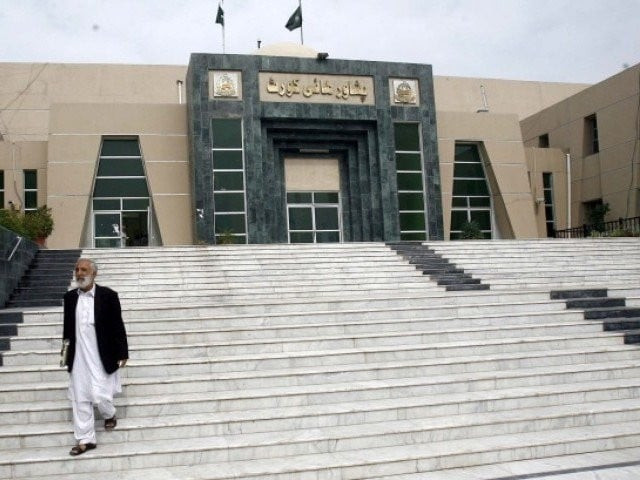Hold your horses: EC courts restrained from hearing cases
PHC orders them to halt decisions till further notice.

Peshawar High Court. PHOTO: PPI
A larger bench of the Peshawar High Court on Monday restrained Ehtesab courts from hearing or deciding any case till further orders.
The five-member bench, headed by Chief Justice Mazhar Alam Miankhel, was hearing 11 petitions challenging Khyber-Pakhtunkhwa Ehtesab Commission Act 2015. The bench was informed about the clash of the act with the National Accountability Bureau Ordinance 1999; a law passed by Parliament.
When the hearing commenced, Aminur Rahman, a member of the panel of lawyers representing the petitioners, told the bench the K-P government approved the EC Act in 2014 to root out corruption.
“As per the rules, members of the Ehtesab Commission would appoint a director general. However, the government appointed a DG of its choice and later recruited the remaining staff,” he argued, saying this was a blatant violation of the law.
Rahman pointed out the commission started arresting people from June 2014, while the notification to form the EC was issued a year later. He contended any action taken or arrest made before the notification was illegal and unconstitutional.
Besides, he said, the EC had been authorised to investigate corruption cases since 2004 ; another violation of the Constitution. He argued any law violating fundamental rights could be challenged at any forum.
Another petitioner’s lawyer, Shumail Ahmad Butt, focused his arguments on the clash of the act with the NAB ordinance. Citing dozens of judgments of supreme courts in USA, Canada, Australia and India, Butt said apex courts preferred federal or central laws such as the NAB Ordinance 1999.
He said any law could be challenged under articles 142, 137, 8 and 97 of the Constitution for transgression, violation of fundamental rights or if two bodies apply laws of the same nature to one field.
Butt pointed out the Parliament formulated the NAB ordinance for the entire country under Article 141 to deal with corruption cases. He said since the EC act was covering the same legal aspects, the current situation created an inconsistency.

Citing some examples from the 1956 and 1962 constitutions to justify his claim of inconsistency, he said any law passed by the provincial assembly could not be applied if it clashed with legislation passed by the Parliament. Butt said both the NAB Ordinance 1999 and the EC Act 2015 contain provisions to deal with corruption cases – two different bodies handling the same subject. “If there is any inconsistency, the ordinance shall prevail,” he argued.
Butt said NAB accountability courts had been declared competent by the Supreme Court of Pakistan. Butt added the establishment of EC courts would also, therefore, be an inconsistency. The lawyer further contended only the federal government had the authority to set up courts after the 18th Constitutional Amendment under Article 137.
“Therefore, the bench is requested to declare the EC courts null and void and stop them from hearing cases,”
he requested.
Published in The Express Tribune, November 24th, 2015.













COMMENTS
Comments are moderated and generally will be posted if they are on-topic and not abusive.
For more information, please see our Comments FAQ